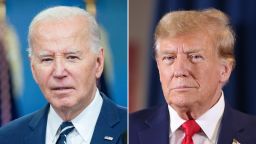Editor’s Note: Jamal Simmons is a longtime Democratic political and communications advisor. He was most recently communications director for Vice President Kamala Harris at the White House and is currently a CNN political commentator. The views expressed in this commentary are his. View more opinion at CNN.
In anticipation of President Joe Biden’s commencement address at Morehouse College on Sunday, Michael Levesque, executive director of the school’s alumni association, invited me to lead a town hall style discussion with current students, faculty, alumni and members of the Board of Trustees last week. Two days before White House adviser Steve Benjamin met with students, I returned to my alma mater to hear directly from various segments of the “Morehouse family” about their priorities, concerns and expectations.

The conversation was off the record, but I can report that students were concerned about the war in Gaza as well as the need to fight antisemitism. They were mindful of history and desired to speak truth to power while upholding the traditions of the college.
They also don’t know that much about Biden’s background, or his Congressional career. Given that the president’s story is at the heart of his political appeal, it raises the question: How can they trust a man they don’t know?
Biden should start his speech by telling these young men who he is, what he believes and why, before telling them what he has done in the past four years or what he wants to do if he wins a second term. It is easy to assume Biden’s decades-long political career makes him a known quantity, but these young voters have only been alive for two decades and have been paying attention to politics for maybe just a few years.
To dig deeper, I asked Levesque to pull together another group of students for an informal but on-the-record focus group. The seven young men who joined me on Zoom were just a small sample, but they made up a cross section of the college by age and region of origin.
They get their information in ways quite different from their parents. They consume news from Apple News, Instagram and TikTok, and cited the Guardian, Wall Street Journal and USA Today as news sources. Only three watched the news on TV and none read actual newspapers.
Only one student knew the tragic story of the president’s first wife dying in a car accident with his one-year-old daughter. They were more familiar with his son Beau Biden’s death from brain cancer in 2015, but barely.
Four out of seven students thought the president was from a rich family. They knew nothing about his ties to Scranton, Pennsylvania, and were surprised to discover he was among the poorest members of Congress before he became vice president.
About half knew Biden was for marriage equality but only one knew he was for it before President Barack Obama.
These students knew little about the warmer parts of Biden’s pre-presidential story, but a lot about the more troublesome aspects. It seems the online algorithms are still serving up negative news from the 2020 presidential campaign and they’re breaking through.
They were familiar with the president’s work on the 1994 crime bill and its impact on mass incarceration. However, none knew that the bill included the Violence Against Women Act and the federal assault weapons ban.
They didn’t know much more about Vice President Kamala Harris’ background either (except a junior from Oakland, where she is from). However, they did call her the “top cop” and point to her prosecution record as San Francisco district attorney.
Was this indicative of a wider phenomenon? Terrance Woodbury, a renowned Democratic pollster and CEO of the public opinion research firm HIT Strategies, says he sees evidence of the same phenomenon.
“In the absence of their bios, a lot of young people only know the negative info they’re being fed about the president and vice president. That’s what’s giving context to their terms in office,” Woodbury said. “We have to give them positive context on who Biden and Harris are and what they’re fighting for.”
That kind of biographical layering is tough in a world where voters often get their information from short videos and memes. A speech like the one at Morehouse, therefore, provides a critical opportunity for Biden. Despite concerns about the US’ support for Israel in its war against Hamas, the students I talked to were not ideological puritans, and they will still be interested in what the president has to say. Biden should use the occasion to draw from his life before his presidency.
Get our free weekly newsletter
- Sign up for CNN Opinion’s newsletter.
- Join us on Twitter and Facebook
Adding those biographical layers — and showing them the man he is, rather than just the politician — is how Biden can build some trust. His story might not sway everyone, but it’s a start — especially with young Americans.
The president must let these students know he is not just the lesser of two evils, because he’s not evil. He’s doing a lot for people in this country and he’s doing it because of who he is and what he believes about America. If they give him a chance, he might give them something they don’t expect — something to believe in.


